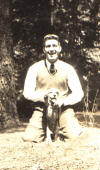My father, "Jimmy"
Dozier, was born in Rock Hill, South Carolina, in 1921, the first son of General James Cordie Dozier and Tallulah Little Dozier. He later moved with his family to Columbia, SC and spent his childhood years at Fort Jackson where his father was stationed. I have heard many stories over the years of the experiences that Daddy and his brother, Donald, had growing up in a military installation. I'll let Daddy tell the story of some of these experiences in his own words. The following excerpt was published in THE COLUMBIA READER, 1786-1986:(preface by Walter B. Edgar, Introduction by John C. Roberson, Photographs by Charles E. Gay and edited by the staffs of the South Caroliniana Library and the Institute for Southern Studies, University of South Carolina).
To actually live on a military reservation was exhilarating, particularly when there was a swimming pool to swim in and a lake to fish in. I even had a pond boat and caught bream with catalba worms and bass with crawdads and broke back pikie plugs. Had a steel rod and a Phleuger Akron reel with black braided line. What else was there? At that time the lake was filled with stumps and all you had to do was cast a crawdad around a stump and usually you were rewarded with a nice bass.
My brother Donald and I and some of our friends from town explored every inch of Camp Jackson. One day we were exploring miles from the house, back on the reservation somewhere, when we came upon a huge earthen mound. It was real high and had a heavy steel door on one side. We managed to pull open this heavy, creaking door and enough light from outside penetrated a part of the gloomy and scary interior. There were wooden racks from the floor to the ceiling and on each rack was a steel tray. There were hundreds of racks and trays. We slid one tray out and it was about six feet long. I want to tell you - it was spooky in there. We closed the heavy door and lit out for home. That night Dad told me that was the place where flu victims who had died were kept until the bodies could be shipped to their homes. I don't know where this mound was or whatever happened to it. I never went back.
The National Guard would come to camp during the summer. I would go down and watch them erect their pyramidal tents over tent floors which was on a line with the mess halls. I would listen to the band practice on the bandstand which was located practically in our front yard. I would go down and sit in the tents and watch the soldiers and listen to them talk and watch them shoot dice and play poker. I would ride my bicycle everywhere and watch everything. One summer I got on the roof of our house and blew my army bugle with which I had gotten pretty good. Nothing wrong with that - except I blew Mess Call at eleven thirty in the morning which was thirty minutes before the National Guard blew it. They came out of the tents and lined up at the mess halls - just a little early. Dad wore me out!
My main job when I got home from school was to haul stove wood in a wheelbarrow and stack it on the back porch. I also hauled logs up to the house to burn in the big fireplace. Dad paid me a quarter a week for these efforts but you would be amazed what you could buy for a quarter in those days. One of my big buys was to get the latest "G-8 and His Battle Aces" and a frozen Milky-Way. Man, that was living.
These are a few memories of a boy growing up in a military environment. In 1938, I entered The Citadel. In 1941, Dad and Mother moved from Camp Jackson. World War II was upon us. Camp Jackson was federalized and became Fort Jackson.


